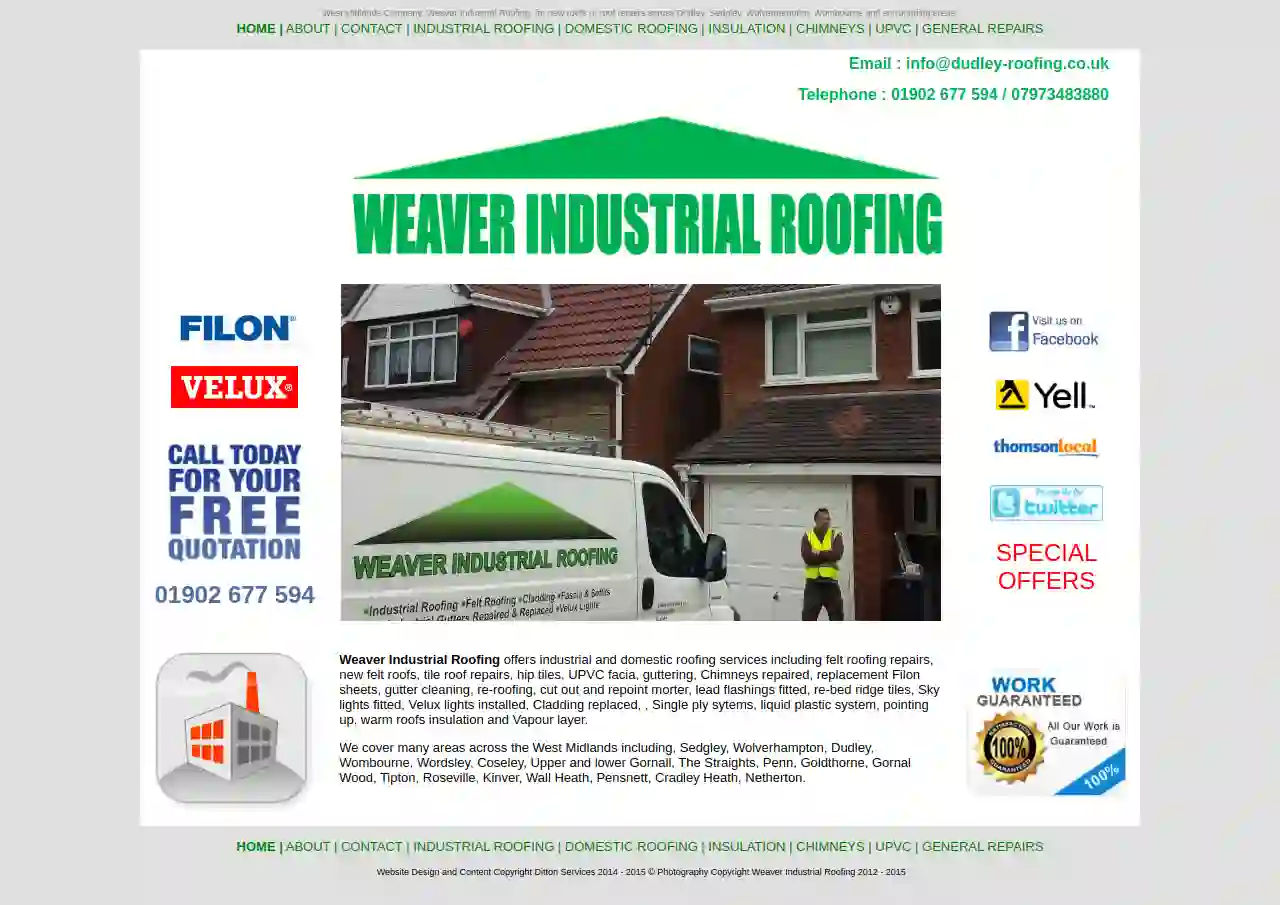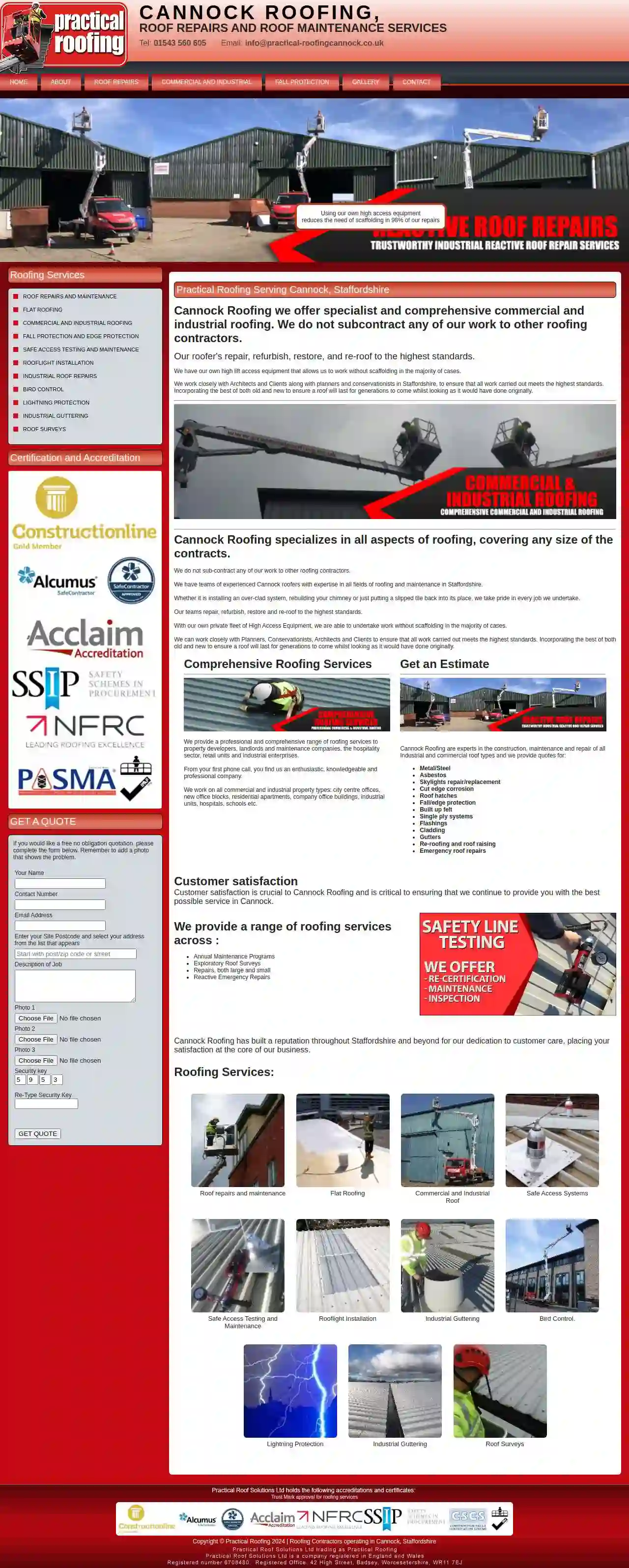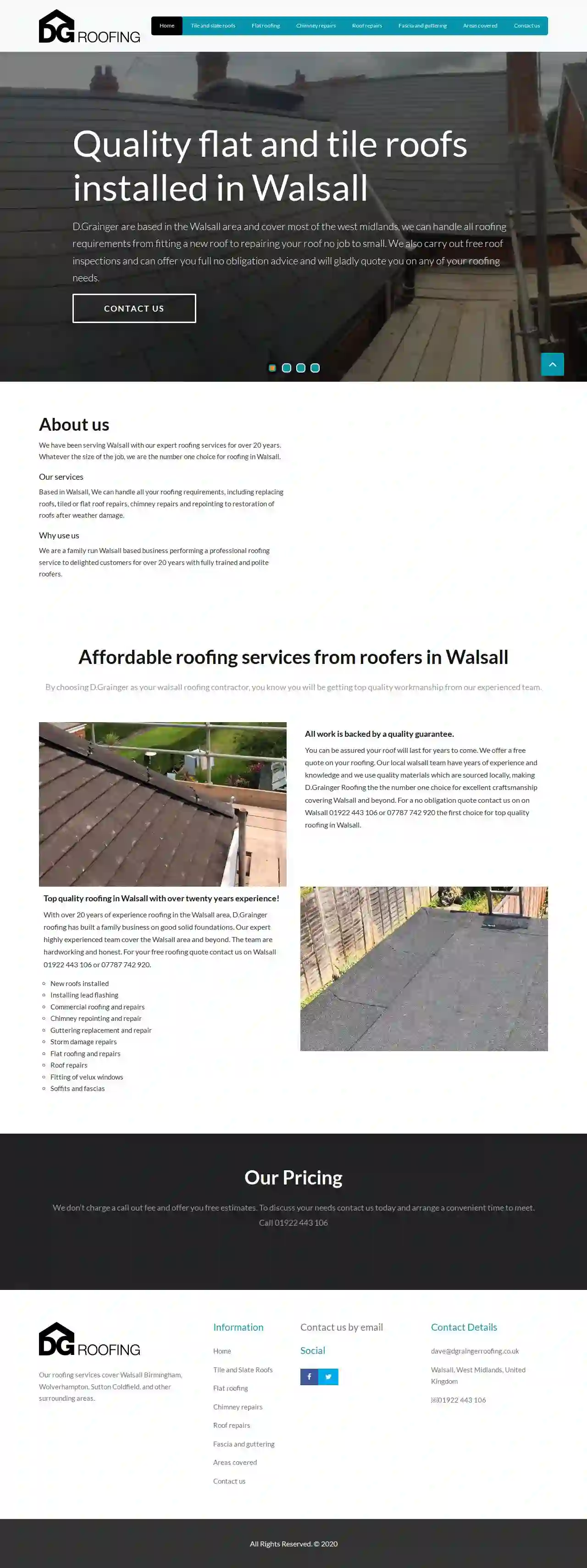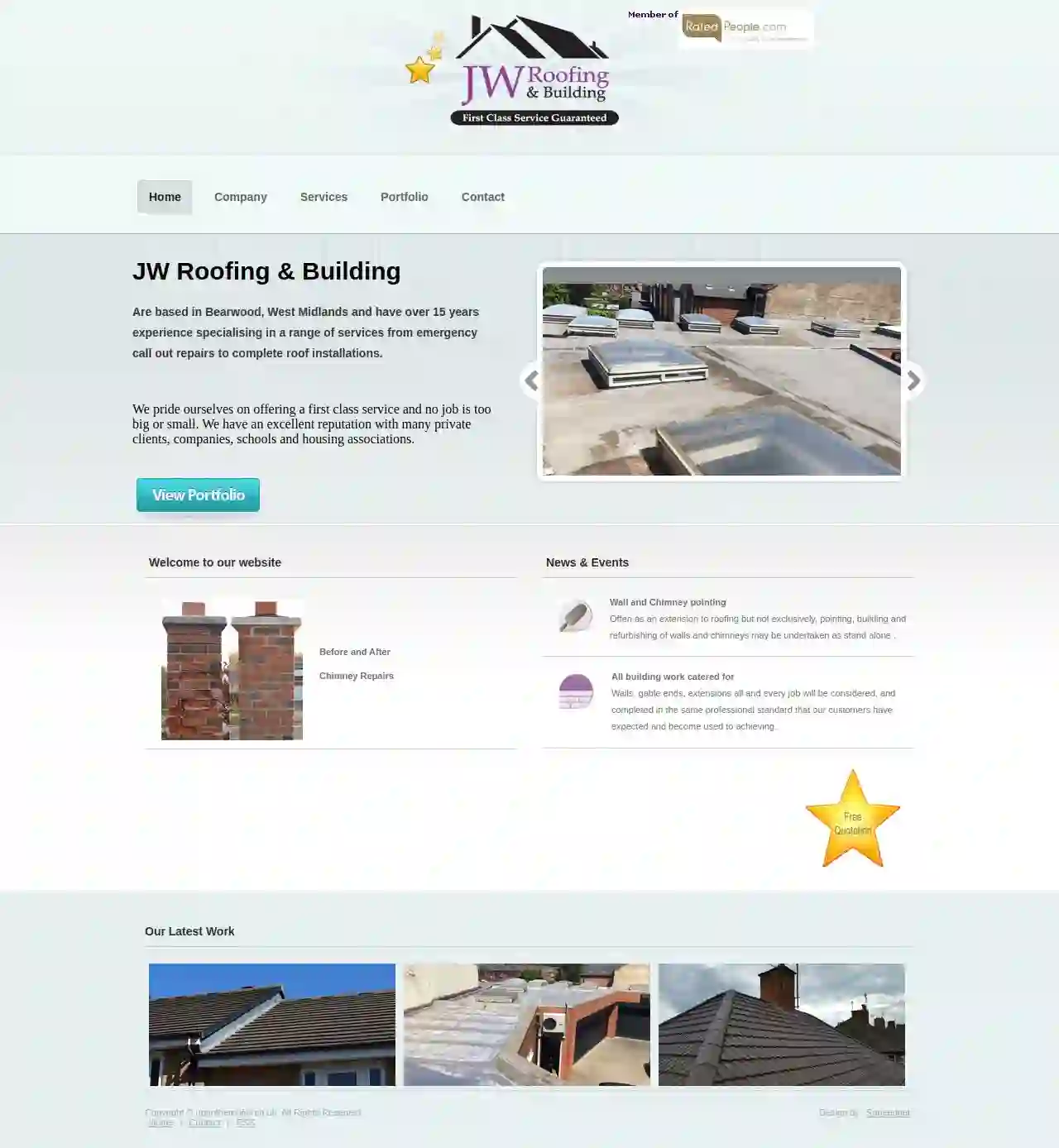Industrial Roofing Contractors West Bromwich
Best Industrial Roofing Company in West Bromwich
Get up to 3 Industrial Roofing Service quotes for your project today! Compare profiles, reviews, accreditations, portfolio, etc... and choose the best offer.

G&M Roofing Services
4.713 reviews36 Hill Street, Burntwood, WS7 3XU, GBG&M Roofing Services is a team of fully-certified professionals dedicated to providing high-quality roofing services to clients across Staffordshire. With years of experience, we tackle projects ranging from small repairs to large-scale installations. Our commitment to customer satisfaction is reflected in our honest, hard-working ethic and our use of traditional methods and top-quality materials. We strive to offer competitive prices without compromising on the quality of our workmanship, ensuring you receive superior roofing solutions without breaking the bank.
- Services
- Why Us?
- Our Team
- Testimonials
- Gallery
Get Quote
Weaver Industrial Roofing
51 reviewsWoodsetton, Dudley, 2 Masefield Avenue, GBWeaver Industrial Roofing offers industrial and domestic roofing services including felt roofing repairs, new felt roofs, tile roof repairs, hip tiles, UPVC facia, guttering, Chimneys repaired, replacement Filon sheets, gutter cleaning, re-roofing, cut out and repoint morter, lead flashings fitted, re-bed ridge tiles, Sky lights fitted, Velux lights installed, Cladding replaced, Single ply systems, liquid plastic system, pointing up, warm roofs insulation and Vapour layer. We cover many areas across the West Midlands including, Sedgley, Wolverhampton, Dudley, Wombourne, Wordsley, Coseley, Upper and lower Gornall, The Straights, Penn, Goldthorne, Gornal Wood, Tipton, Roseville, Kinver, Wall Heath, Pensnett, Cradley Heath, Netherton. We pride ourselves on offering you the very best solutions for your roof repairs and new installations. We keep up to date with the latest systems while at the same time can offer authentic solutions for older buildings. One example of this are the old coal tar roofs we have worked on at The Black Country Living Museum. So whether you have a period building or a modern one, large or small, residential or industrial, we can offer the skills and experience to provide you with exactly what you need. We offer free, no obligation quotations, all work is completed professionally, and you can have peace of mind knowing we have full public liability insurance. On top of that all our work is guaranteed.
- Services
- Why Us?
- Our Team
- Gallery
Get Quote
J Harris Roofing
Cannock, 47 Rowan Close, WS12 4GD, GBJ Harris Roofing is a renowned family-run business providing professional and reliable roofing services in Cannock and surrounding areas. With a reputation for supplying first-class roofing services at an affordable price, we pledge to treat your property with respect and care. Our team of experienced and highly skilled roofers perform all manner of commercial and domestic roofing works, using only the best materials and techniques. We specialize in new roofs, flat roofs, garage roofs, emergency roof repairs, skylights, velux windows, drone surveys, chimneys, lead work, waterproofing, liquid roofing system, guttering, roof insulation, rubber roofing, green roofs, and cladding, fascias, and soffits. Our commitment to excellent customer service, attention to detail, and pride in our work ensures a pleasant and satisfying experience for every customer.
- Services
- Why Us?
- Accreditations
- Our Team
- Gallery
Get Quote
National Plastics, Wolverhampton
4.79 reviewsGBNational Plastics is a leading supplier of high-quality plastic building products to both trade and DIY customers. With a wide range of products including bathroom wall panels, kitchen wall panels, fascia and soffit boards, guttering, trims, and more, we offer competitive prices and nationwide coverage with branches conveniently located across the UK. Our team of experts is dedicated to providing exceptional customer service and helping you find the perfect solutions for your building projects.
- Services
- Why Us?
- Accreditations
- Our Team
- Testimonials
- Gallery
Get Quote
Bromsgrove Roofing
4.25 reviewsBromsgrove, B60, GBWest Midlands Roofing Network is a network of roofing professionals serving Bromsgrove and surrounding areas. We offer a wide range of roofing services for both domestic and commercial properties, including roof repairs, flat roofing, guttering, fascias & soffits, and more. Our members are experienced and qualified roofers who are committed to providing high-quality workmanship and customer service. We understand that your roof is a vital part of your home or business, and we take pride in providing reliable and durable solutions to protect your investment. Whether you need a small repair or a complete roof replacement, our team can help. Contact us today for a free quote and let us take care of all your roofing needs.
- Services
- Why Us?
- Gallery
Get Quote
Cannock Roofing
51 reviewsCannock, WS11, GBCannock Roofing is a specialist roofing company based in Cannock, Staffordshire, offering a comprehensive range of commercial and industrial roofing services. We pride ourselves on our commitment to quality, customer satisfaction, and providing expert solutions for all your roofing needs. Our team of experienced roofers has a wealth of knowledge and expertise in all aspects of roofing, from repairs and maintenance to new installations and re-roofing projects. We utilize our own high-access equipment, minimizing the need for scaffolding in most cases, ensuring efficient and cost-effective service delivery. At Cannock Roofing, we understand the importance of working closely with clients, architects, planners, and conservationists to ensure that all projects meet the highest standards. We strive to incorporate the best of both traditional and modern techniques, creating durable and aesthetically pleasing roofs that will last for generations. Whether you require a small repair or a large-scale commercial project, Cannock Roofing is your trusted partner for all your roofing needs. Contact us today for a free, no-obligation quote.
- Services
- Why Us?
- Gallery
Get Quote
Seal max roofing
Acocks Green, B13, GBWest Midlands Roofing Network is a network of roofing professionals serving the Acocks Green area. They offer a wide range of roofing services for both residential and commercial properties, including roof repairs, flat roofing, guttering, fascias & soffits, and more. The company emphasizes the importance of a well-built roof and highlights the potential damage that even small leaks can cause. They encourage homeowners to contact them for a free quote if they need any roofing services.
- Services
- Why Us?
- Gallery
Get Quote
D Grainger Roofing
527 reviewsWalsall, GBD.Grainger are based in the Walsall area and cover most of the west midlands, we can handle all roofing requirements from fitting a new roof to repairing your roof no job to small. We also carry out free roof inspections and can offer you full no obligation advice and will gladly quote you on any of your roofing needs. We have been serving Walsall with our expert roofing services for over 20 years. Whatever the size of the job, we are the number one choice for roofing in Walsall.Our services include replacing roofs, tiled or flat roof repairs, chimney repairs and repointing to restoration of roofs after weather damage. We are a family run Walsall based business performing a professional roofing service to delighted customers for over 20 years with fully trained and polite roofers.
- Services
- Why Us?
- Gallery
Get Quote
James Mathew Roofing Ltd
12 reviewsBillesley, GBWest Midlands Roofing Network is a network of roofing professionals serving Billesley and surrounding areas. We offer a wide range of roofing services for both residential and commercial customers, including roof repairs, flat roofing, guttering, fascias & soffits, and more. Our members are experienced and qualified roofers who are committed to providing high-quality workmanship at competitive prices. We understand that your roof is a vital part of your home or business, and we take pride in providing reliable and durable roofing solutions. Whether you need a small repair or a complete roof replacement, our team can help. Contact us today for a free quote.
- Services
- Why Us?
- Gallery
Get Quote
JW Roofing & Building
1.77 reviews80 Abbey Road, Birmingham, B67 5LH, GBJW Roofing & Building is a company based in Bearwood, West Midlands, with over 15 years of experience in a range of roofing services. From emergency call-out repairs to complete roof installations, they pride themselves on offering a first-class service for both domestic and commercial clients. They have a strong reputation with private clients, companies, schools, and housing associations. The company is committed to providing a professional, efficient, and quality service, with a focus on customer satisfaction. They are fully insured and offer a 7-day-a-week call-out service. JW Roofing & Building is an approved contractor for Sandwell Council and a member of Rated People, boasting an expert status due to numerous five-star ratings.
- Services
- Why Us?
- Accreditations
- Our Team
- Testimonials
- Gallery
Get Quote
Over 12,314+ Roofers in our network
Our roofing experts operate in West Bromwich and beyond!
Roofyng.co.uk has curated and vetted Top Roofers in West Bromwich. Find the most reliable business today.
Industrial Roofing FAQs
- Manufacturer's Warranty: Provided by the manufacturer of the roofing materials, covering defects in materials. Length varies depending on the material and manufacturer.
- Contractor's Warranty: Offered by the roofing contractor, covering the quality of their workmanship. Usually covers a shorter period than the material warranty, typically 1 to 10 years.
- Reduced Energy Costs: Lower cooling loads reduce energy consumption and operating costs for air conditioning.
- Improved Indoor Comfort: Keeps the building cooler, enhancing worker comfort and productivity.
- Extended Roof Lifespan: Reduces heat stress on roofing materials, extending their lifespan.
- Environmental Benefits: Decreased energy demand lowers greenhouse gas emissions and reduces the urban heat island effect.
- Built-Up Roofing (BUR): A traditional, multi-layered system using asphalt-saturated felt or fiberglass, interlaid with hot asphalt, and topped with gravel or aggregate. Known for its durability, waterproofing, and affordability.
- Modified Bitumen Roofing: A single-ply system using asphalt-based sheets modified with polymers for enhanced flexibility and weather resistance. Offers good durability, flexibility, and ease of installation.
- Single-Ply Membrane Roofing: A modern system using a single layer of waterproof membrane, typically EPDM, TPO, or PVC. Favored for flexibility, ease of installation, and energy efficiency.
- Metal Roofing: Durable, long-lasting, and fire-resistant. Comes in styles like standing seam, corrugated, and metal shingles.
- Spray Polyurethane Foam (SPF) Roofing: A spray-applied, seamless system providing excellent insulation, waterproofing, and energy efficiency.
What are the different types of warranties for industrial roofs?
What is the difference between commercial roofing and industrial roofing?
Commercial Roofing: Typically refers to roofing systems used on buildings like offices, retail stores, and apartment complexes. These roofs are usually less complex than industrial roofs.
Industrial Roofing: Covers larger, more complex structures like factories and warehouses, often requiring specialized materials and expertise.
The key differences lie in the scale, complexity, and specific needs of the building.
What are the benefits of a cool roof for my industrial building?
What are the different types of industrial roofing systems?
What are the different types of warranties for industrial roofs?
- Manufacturer's Warranty: Provided by the manufacturer of the roofing materials, covering defects in materials. Length varies depending on the material and manufacturer.
- Contractor's Warranty: Offered by the roofing contractor, covering the quality of their workmanship. Usually covers a shorter period than the material warranty, typically 1 to 10 years.
What is the difference between commercial roofing and industrial roofing?
Commercial Roofing: Typically refers to roofing systems used on buildings like offices, retail stores, and apartment complexes. These roofs are usually less complex than industrial roofs.
Industrial Roofing: Covers larger, more complex structures like factories and warehouses, often requiring specialized materials and expertise.
The key differences lie in the scale, complexity, and specific needs of the building.
What are the benefits of a cool roof for my industrial building?
- Reduced Energy Costs: Lower cooling loads reduce energy consumption and operating costs for air conditioning.
- Improved Indoor Comfort: Keeps the building cooler, enhancing worker comfort and productivity.
- Extended Roof Lifespan: Reduces heat stress on roofing materials, extending their lifespan.
- Environmental Benefits: Decreased energy demand lowers greenhouse gas emissions and reduces the urban heat island effect.
What are the different types of industrial roofing systems?
- Built-Up Roofing (BUR): A traditional, multi-layered system using asphalt-saturated felt or fiberglass, interlaid with hot asphalt, and topped with gravel or aggregate. Known for its durability, waterproofing, and affordability.
- Modified Bitumen Roofing: A single-ply system using asphalt-based sheets modified with polymers for enhanced flexibility and weather resistance. Offers good durability, flexibility, and ease of installation.
- Single-Ply Membrane Roofing: A modern system using a single layer of waterproof membrane, typically EPDM, TPO, or PVC. Favored for flexibility, ease of installation, and energy efficiency.
- Metal Roofing: Durable, long-lasting, and fire-resistant. Comes in styles like standing seam, corrugated, and metal shingles.
- Spray Polyurethane Foam (SPF) Roofing: A spray-applied, seamless system providing excellent insulation, waterproofing, and energy efficiency.